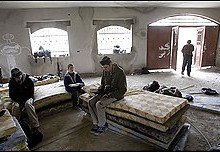Hebron House Latest Flashpoint in City
HEBRON, West Bank — When 14 Jewish families moved into a Palestinian house in Hebron _ a sacred West Bank city and traditional burial site of biblical patriarch Abraham _ Israel vowed to kick them out.
But three months later, they’re still there _ children huddling on a single mattress, mothers cooking in a makeshift kitchen, and soldiers patrolling the rooftop.
The scene highlights the Israeli government’s inability to carry through with its electoral pledge to begin removing West Bank settlers, who are becoming increasingly bold in the face of failed peacemaking.
Hebron, a frequent flashpoint of tensions between Israelis and Palestinians, is home to about 500 Jewish settlers living in heavily guarded enclaves among some 160,000 Palestinians. Clashes are frequent.
Israel controls the center of the city, while the Palestinians have the rest. Israel’s large military presence often hinders the movement of Palestinians.
The disputed house has only added to the tension. Situated on a hilltop, the four-story building is of strategic value _ it overlooks the city and is a gateway between Hebron and the nearby Jewish settlement of Kiryat Arba. The settlers say they want to create a land link between the two.
Dozens of Jewish settlers moved into the building in March, saying the house was purchased legally. The Palestinian owner denied selling the home but has since been jailed by the Palestinian Authority because of the deal. Regardless, any settler real estate purchase or building of a new home in the West Bank requires government approval.
Defense Minister Amir Peretz initially ordered the settlers to leave, but he was overruled by Prime Minister Ehud Olmert, who ordered a legal review. The matter is currently in the hands of government and military legal advisers and will likely be followed by a settler appeal to Israel’s Supreme Court.
Israeli military officials, speaking on condition of anonymity because of the sensitivity of the matter, said Thursday that it would take months before any action could be taken against the settlers, if at all.
The settlers have erected a synagogue in the squalid building, moved their large families into its bare housing units and placed their appliances and belongings on the concrete floors.
“We have no plans of leaving. It belongs to us, why would we ever leave it?” said David Wilder, a spokesman for Hebron’s Jewish settlers. “We spent a lot of money to move here and we will renovate it … we will never be expelled from the building.”
Israel captured the West Bank and Gaza 40 years ago, and 270,000 Israelis live in settlements in the West Bank, which Palestinians claim as part of a future independent state. In 2005 Israel pulled out of Gaza and took down four small settlements in the West Bank.
With peace efforts in the deep freeze, the settlers are making a comeback.
In addition to taking over the Hebron house, settlers are planning a march next week to the site of the evacuated settlement of Homesh in the northern West Bank. Settlers have staged a number of standoffs at the site and are pledging to rebuild it.
“We took a hard hit (in Gaza),” said Yishay Hollander, spokesman for the settlers’ council. “They took off our hand, but we still have the whole body and it is getting stronger _ and we believe we can also fix the hand.”
Israeli doves say the government must crack down on settlement expansion if it has any hopes of ultimately reaching a peace deal with the Palestinians.
“There is a principle involved here: the settlers are proving that every house they buy they move into,” said Yariv Oppenheimer, head of the anti-settlement Israeli group Peace Now. “And the government is sending a message that the power to decide where Jews live in the West Bank belongs to the settlers and not the country.”
Olmert was elected last year on a pledge to evacuate additional West Bank settlements and draw Israel’s borders without waiting for a peace deal with the Palestinians. However, he shelved the plan after emerging politically weakened from Israel’s war against Hezbollah guerrillas in Lebanon last summer.
Olmert and Peretz have also repeatedly vowed to dismantle dozens of unauthorized settlement outposts, but have not done so since a violent clash with settlers in the evacuation of the outpost of Amona in February 2006.

 Contact aron
Contact aron RSS SUBSCRIBE
RSS SUBSCRIBE ALERT
ALERT